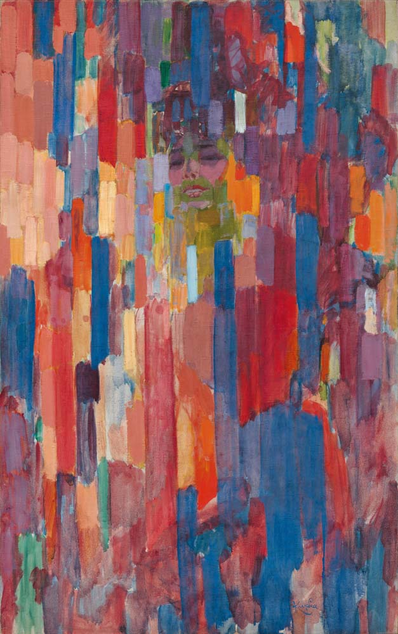|
Madame Kupka Among Verticals Madame Kupka’s torso emulsifies in a shower of parti-coloured bands, blues and reds, purples and greens, disappears like a Cheshire cat. Her delicate face, tilted chin, and slightly parted lips are the next to go. Half seen and unseen, her eyes are closed either because she’s blind or dreaming. From a position below her chin we watch the last of her dissolve, red lips circled by green eye shadow, hair piled up in a cloud beckoning a storm. Frank made this portrait of his wife three years before the war to end all wars, his announcement card for the end of mimesis and the birth of modernity, turning his wife into a visual metaphor. We see Eugenie slip beneath the choppy strips like a body sliding into a pool, no arms to wave goodbye with, not even legs to back away from the edge of becoming an abstract being, not merely a verb, like abstraction from nature, the old method by which even the ancients almost did the same thing to the Venus of Willendorf or those thundering herds on the walls of Lascaux. Her portrait’s a noun, an object as abstract as a thought, as real as a spoon, a woman hiding behind a shower curtain like Joseph’s coat of many colours. Select, distort and emphasize was the game the ancients played and Picasso too before he stepped back from the brink afraid of losing the last glimpse of a woman’s breast or a lover’s thigh. That was not enough for Kupka who went all in on art as religion. Soon nothing of the real remained of his wife but coloured strokes up and down. He erased her from an old canvas and she loved him enough to give away her arms and shoulders to the future, like an astronaut on a space walk, drifting away, a Venus who became one with the frame. Michael Salcman Michael Salcman is a retired physician and teacher of art history. He was chairman of neurosurgery at the University of Maryland and president of the Contemporary Museum in Baltimore. He is a child of the Holocaust and a survivor of polio. His poems have appeared in Arts & Letters, Harvard Review, Hopkins Review, The Hudson Review, New Letters, and Poet Lore. His books include The Clock Made of Confetti (Orchises), nominated for The Poet’s Prize, The Enemy of Good Is Better (Orchises), Poetry in Medicine, a widely used anthology of classic and contemporary poems on doctors, patients, illness and healing (Persea Books, 2015), and A Prague Spring, Before & After (2016), winner of the 2015 Sinclair Poetry Prize from Evening Street Press. Shades & Graces, forthcoming from Spuyten Duyvil (2020) won the inaugural Daniel Hoffman Legacy Book Prize. Many of the poems in his published collections are ekphrastic in nature (especially in The Clock made of Confetti).
1 Comment
Q
5/14/2024 12:06:19 pm
I think this poem is beautiful. I saw this painting recently and it revolutionized the way I think. I know that sounds prissy, but it's true for this painting more than maybe maybe anything I've ever seen. I really appreciate this look into it.
Reply
Your comment will be posted after it is approved.
Leave a Reply. |
The Ekphrastic Review
COOKIES/PRIVACY
This site uses cookies to deliver your best navigation experience this time and next. Continuing here means you consent to cookies. Thank you. Join us on Facebook:
July 2024
|




